- Home
- Jeff Mariotte
Serpents in the Garden Page 8
Serpents in the Garden Read online
Page 8
“Me?” Nyran asked. He was just a boy, a mere slip of one, and he did not feel like a hero. Instead of answering, his mother fell to her knees beside him and locked him in an embrace that he thought would surely snap his bones.
And Nyran thought, One day, I will live up to my father’s example. And Selanee’s.
One day, I will be a hero.
He was still waiting for that day to come.
He had been no hero with Joslen. He’d been humiliated in front of her. He couldn’t live that down.
Unless . . .
Glancing around him, Nyran saw that working toward the far side had put space between him and the rest, as he’d hoped. They moved down one row and up the next, but he stopped at the end of his last one, moved to the next row’s end, and picked the fuferan pods there, then to the next one, each row increasing his distance from the others.
Finally, nobody was looking his way. Nyran had been waiting for this chance, planning for it. He’d brought a skin pouch from home and had tucked some fruits into it as he worked his way through the fields, for rations. Knowing he would be in for serious punishment for deserting his basket and his harvest, he darted for the shelter of the trees. Soon he could see the fields no longer, which meant those working there couldn’t see him. The forest was dense and gloomy, the canopy overhead cutting off the sunlight except in a few spots where it broke through and illuminated individual branches, spreading ferns, and mushrooms of various descriptions growing up the sides of trees.
He could be at Joslen’s town by nightfall. Sooner, with a little luck. He could locate her house, find her special pot, and be home tomorrow. He would take whatever punishment came his way if he could just save face with her by delivering her most precious item. He would do whatever it took.
He was young, and he was in love, and that was enough.
Ten
Kirk’s basket was growing heavy with spiny confolli fruits. Everybody had the same size basket, even the children. Carrying his basket back to Freehold would be wearying. He guessed there was some trick to basket wrangling that he didn’t know. He knew people sometimes carried baskets on their heads, but that was something they didn’t teach at Starfleet Academy, or back home in Iowa.
He was still pondering the question when the gunfire started.
The first volley came all at once. In the valley, with the river’s constant murmur and a soft breeze rustling the trees and the voices of the Freeholders calling out to one another, it seemed muffled, distant popping sounds. But the rounds flew into the field, whining like angry insects. A man a couple of rows from Kirk was hit, blood spraying from the side of his head in a fine, red mist.
“Get down!” Kirk shouted to Meena, who was working beside him. She was slow to respond, but before he could push her down she had dropped and scooped up her flintlock. She rose up on one knee and aimed at the trees. Kirk cocked his lever-action rifle and did the same. While he waited for the attackers to show themselves, he scanned the fields. Most of the Freeholders had taken up arms, but several were visibly wounded, and he saw people tending to those who had fallen.
Another volley came from the trees, and then the firing became sporadic. Freeholders fired back at unseen targets. Kirk held his fire, not willing to waste the ammunition. He hadn’t come to take up arms for one side or the other, but fired upon, he was obligated to defend himself.
“Damned slavers,” Meena said. Kirk risked a quick glance at her. She was sighting down the long barrel of her flintlock, one eye closed, but she had not fired. “Nothing is sacred to them. Even here, to this spot so rich with beauty and life, they bring violence and death.” Sleeves covered her shoulders and most of her arms, but Kirk wondered how many tattooed bars were there.
Kirk returned his gaze to the trees. He was starting to see bursts of motion there, people darting through the shadowed depths and the lighter spaces in between. When one froze, half in shadow, and fired toward the field, Kirk aimed at the muzzle flash and squeezed the trigger. He thought he heard a cry, but in the general cacophony it was hard to be sure.
The other Starfleet personnel were on guard duty at the edge of the fields, between the harvesters and the trees, along with a dedicated force of Freeholders. The first volley of shots had cut into their numbers, but now workers in the rows of crops moved toward them, heads down, baskets left behind and weapons in hand. Others stayed where they were, partly hidden by trees and bushes, firing when they had targets or simply laying down a barrage to allow the others to move unimpeded.
Kirk located Rowland and Burch, but not Hay. He didn’t know if the big man had taken refuge in the fields or was simply crouched down on the front lines. He whispered to Meena to stay put—without a clue as to whether she would obey—and started toward the field’s edge at a low run. A shot rang out from the trees and the round whipped past him, close enough for him to feel the breeze. He threw himself down as two more pocked the air where he had just been.
Kirk moved forward on his belly for a meter, came up, fired a couple of shots toward where the incoming rounds had originated, then dropped and advanced again.
He had almost reached the front line when a group of five Victors broke from the trees and came straight toward him. Two of them fired indiscriminately, trying only to keep Freeholders from sighting in on them. The other three appeared to have a single-minded focus on Kirk. They weren’t carrying guns. Two had big nets and the third a coil of rope and a short, stout club.
They were slavers, and they were intent on capture, not murder.
Kirk levered a round into the chamber and squeezed the trigger. The weapon clicked. He squeezed again, more urgently. Click.
The Victor slavers were closer. The outer pair fired, and fired again. The three in the middle closed on Kirk, their faces eager, bright with the thrill of the hunt.
Kirk spun the weapon around in his hands. He had played some baseball, in younger days. What he had lacked in fielding ability, he’d made up for by being a power hitter.
He held the rifle by the barrel and swung for the fences.
The rifle’s stock caught the nearest man in the jaw. The blow snapped his head to the right, spraying teeth and blood from his open mouth. He fell forward, carried by his own momentum, and almost landed on Kirk. The admiral sidestepped and the man flailed past.
Kirk brought the gun back around, low, out of time to raise it. The man with the club and the rope was almost on him, but Kirk shoved the rifle into the man’s way. Its length tangled with his legs and he went down in a heap, yanking the gun from Kirk’s grip as he did. He threw out one arm in a desperate attempt to steady himself, and Kirk grabbed the club from that hand. As the man tumbled down, Kirk stepped forward and swung the club in a short, tight arc. It struck the back of the man’s head with a sickening crunch, and the man went still.
Turning to the third one, Kirk saw that he was spinning his net over his head, getting it ready to toss. He looked skilled with it, practiced. Its diameter increased with every spin. If it reached Kirk, he would be entangled, helpless to defend himself.
He still held the club, though. And it would travel faster than a net.
He rocketed it toward the man with the net. It crashed into his upper chest. He staggered, falling back three steps, losing control of his net. It draped partly over him as he tried to regain his composure. He clawed at it, but before he could free himself, Kirk covered the distance between them. With a running leap, he landed on the man, driving him to the ground. A few well-placed blows rendered his foe unconscious. Kirk snatched up the club again and looked for the next attacker.
But there were none. Any remaining in the trees had retreated, already out of sight. The dead and the wounded littered the space between the tree line and the cultivated fields, still forms with splayed-out limbs, or twitching, quaking, bleeding ones crying out for aid or stoically enduring obvious agony. Kirk realized that there were fallen within the fields, too; Freeholders had been killed and injured, though not i
n the numbers that the Victors had.
Then his gaze landed upon Apryl Burch, crouched beside a body, and her expression told him the worst had happened.
Kirk started toward her, scanning the survivors and spotting Rowland, also making his way in that direction.
The big man had taken three rounds, two in the chest and one in the throat. His Freeholder clothing was soaked in blood, as was the dirt where he lay. Burch’s eyes were dry, though her face showed that her lack of tears was an act of will, not a dearth of emotion. Elanna had seen Hay and come running, pushing past her fellow townspeople and throwing herself over Hay’s lifeless body. Her wailing reached to the sky, and the tears slicked her face and pelted the ground like rain.
Kirk glanced up, once. Somewhere up there, out of sight, out of orbit, was the Captain Cook. Had he a way to reach the ship, he could arrange to have Hay’s body beamed off-planet, stored until appropriate arrangements could be made. He had hoped this mission would be quick and easy, that it would not necessitate the hardest part of an officer’s job: notifying next of kin that a loved one had paid the ultimate price.
It had turned deadly.
“Oh, no,” Rowland muttered as he approached. “Is he—?”
“Yes,” Kirk replied. “I’m afraid so.”
Rowland looked on in stunned silence. His skin had gone ashen. Kirk realized this was probably the first time he had lost a comrade.
“We’ll bury him,” Kirk said quietly, so the Freeholders around couldn’t hear. Most, save Elanna, were busy with their own wounded and dead. “With all appropriate formalities. When the opportunity arises, we’ll beam him out. One way or another, we’ll get him home.”
“Aye, sir.” Rowland swallowed. Kirk could see him fight to hold back tears, blinking his eyes, stiffening his posture. “Thank you, sir.”
For what? Kirk berated himself. For asking you and Hay and Burch to put yourselves in harm’s way? For failing to prevent the civil war I saw brewing the last time I was here? He didn’t know what he could have done—the ensuing years had not offered an answer—but if there had been anything, any possible solution, he should have stayed until he found it.
That had been impossible, of course. He was just one man, not a god, not some kind of super-being. Free people made their own choices, and sometimes those choices included hating one another. He could try to offer an example, he could step in on those limited occasions when he might actually do good. But he could not blame himself for every failure, every missed opportunity. That was an invitation to madness.
He couldn’t tell Rowland all that, though. Now Burch stood beside them, a trembling hand gripping Rowland’s arm. “We’ll do what’s right,” Kirk said softly. “We’ll take care of him.”
* * *
There were only the four of them on the hill, as the sun’s last rays touched the peaks of the nearest mountains. Kirk had explained to Tyree that this was the way of his people, that they needed solitude for their mourning ritual. Tyree had bid the other Freeholders give them their privacy, and he had posted guards around the hill’s base to ensure it. They had taken turns with borrowed shovels, digging a hole deep enough to protect Hay from predation, but not so deep as to be a final resting place.
Titus Hay was in the grave and covered with soil. Kirk stood at the head of the mound, his head bowed. “I wish I had known Titus Hay better,” he said. “I would have been proud to have him as part of my crew, on any ship at any time. He was brave and stalwart and true, that much I can say with certainty. He formed friendships fast, strong ones, lasting ones. He was always ready with a joke or a story or a pleasant word, but during the time I knew him, I saw him to be a listener, too, genuinely interested in whoever was speaking at the time. He was curious and kind and smart, and any world would be a better place with him in it. The people of this one may never be able to appreciate the treasure they had here, for a few days. All we can do is try to see that his sacrifice was not in vain. He gave himself to try to secure peace for them.”
“Amen,” Rowland said.
“This is not good-bye, Mister Hay,” Kirk added. “Only a temporary resting place. We will be back for you.”
The admiral said no more. The three officers stood together, heads lowered, as the last sunlight winked from the sky.
* * *
“. . . they were not there for us,” someone was saying. He rose up on the balls of his feet, finding Kirk, Rowland, and Burch standing at the crowd’s edge, up against a wall in the town’s great hall, and thrusting an accusatory finger at them. “They came for them!”
“Bad enough we have to worry about our own lives,” another Freeholder added. This one was a sturdy woman with flaming red hair. “Without them making it worse.”
“My friends,” Tyree said, raising his hands in a conciliatory gesture. The people had gathered in the big hall just off Freehold’s central plaza, where Tyree had been holding court when they arrived. “We have had trouble with the Victors for years now. Never have we blamed it on outsiders. No matter how many different settlements emptied out, how many towns we absorbed into Freehold, we never said this tribe, or that one, were the cause of our woes. We will not blame these three—who came to help us, who lost one of their own today in our defense.”
“You call us friends, Tyree,” the first speaker said. He was tall and leaner than most Freeholders, and his long, platinum hair had been pulled back and tied behind his head. “But you call them friends, as well. Perhaps both cannot be—”
The door flew open and the man’s diatribe halted mid-sentence. He stared toward the doorway. Kirk followed his gaze and saw Elanna there, standing straight and strong, though her eyes and nose were red from grief. Beside her stood a girl in her teens, her shoulders hunched, sorrow and fear marking a face that still glistened with tears.
“Elanna?” Tyree said.
“Joslen would speak.”
“Very well. Joslen?”
“Nyran,” the girl said, her voice tremulous. “Has anyone seen him?”
“Of course,” someone answered. “Just this morning—”
“Since the raid,” she interrupted. “At Providence.”
“You haven’t seen him since?” Kirk asked.
“I did not know he had gone,” Joslen said. “I was looking everywhere for him, searching the town. Elanna said he was there, but she could not remember if he had returned with the rest of the group.”
“All the wounded, the dead. The confusion,” Elanna said. “And Hay, who had become my friend.”
“I do not hold you at fault,” Joslen said. “Or anyone. I merely wish to know if he has been seen, since then.”
No one came forward.
“Then I must go there,” Joslen said. “To the Valley.”
“Not tonight,” Tyree said. “It is not safe.”
“If not safe for her,” Elanna said. “Is it safe for my son? Out there, perhaps hurt? Alone?”
“The night belongs to the mugatos,” Tyree reminded her. “And to the Victors, with their weapons. Come morning, we will—”
“Come morning it may be too late!”
“There is nothing else for it,” Tyree said. “To send out a party now would be to risk the deaths of all. And we do not know if he is even there. Until we have searched every home in Freehold—”
“My son was there this afternoon,” Elanna said, tears tracking down her cheeks. “I helped bring home the injured and lost sight of him. A mother’s gravest duty is the safety of her children, and I failed in mine.”
“But to go out there now would be to risk leaving Nyran without a father or a mother. The boy’s no fool. If he’s there, he’ll seek shelter until the dawn.”
“If he’s hurt—”
“We can but hope for the best,” Tyree said. Nobody pointed out that if Nyran was hurt, and out there alone, he was likely already dead.
Finally, Elanna and Joslen gave in, after the townsfolk agreed to launch a major expedition at first light. In the mea
ntime, they would turn Freehold upside down looking for him.
Kirk wished, and not for the first time, that he had the Enterprise at his back. But instead, he was stuck here on the surface, without backup, armed only with the ancient weapons of the day. A part of Kirk raged against the restrictions Starfleet had placed on him, while another part whispered to him that his interference, all those years ago, was responsible.
He would join the search party, offer what help he could. It was less than he would have liked, but it was the best he could do.
Eleven
“Do you know him well?” Kirk asked. “The missing boy.”
“Nyran? As well as any, I suppose,” Meena said. They were walking the streets of Freehold, after the meeting had broken up. It was dark, with the only stray illumination coming from un-shuttered windows here and there, and the silvery glow of a half moon. “We are—we were, a small settlement. Everybody knows everyone. I am younger than his mother but quite a bit older than him. I watched him grow up.”
“Does this sound like him? Disappearing?”
“As Elanna said, if he were hurt—”
“If he’d been hurt, we would have seen him. We scoured every row of those fields, after the attack. We knew there were wounded and dead. We looked everywhere. He wasn’t there,” Kirk said.
“You did not say so, during the meeting.”
“I’m an outsider here. You heard—some of them were ready to blame us for the attack.”
“You speak the truth. If Nyran had been there, we would have found him.”
“We know he was with us.”
“Yes . . .”
“So he left on his own. Before the attack.”
“So it would seem. I had not thought of it before, but yes, it must have been that way.”
“In the morning, we’ll accompany the search party,” Kirk said. “But we’ll have to be prepared to expand the search area. If he had something in mind, some specific destination, he’ll have had plenty of time to get there.”

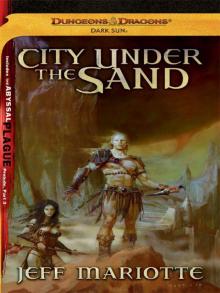 City Under the Sand
City Under the Sand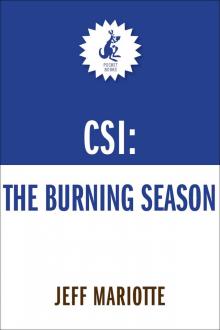 The Burning Season
The Burning Season Sanctuary
Sanctuary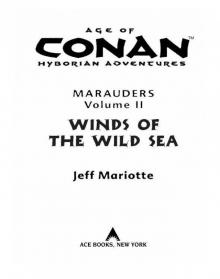 Winds of the Wild Sea
Winds of the Wild Sea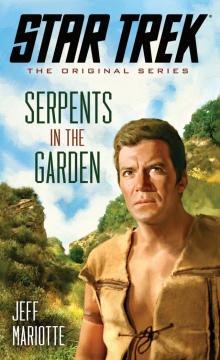 Serpents in the Garden
Serpents in the Garden Close to the Ground
Close to the Ground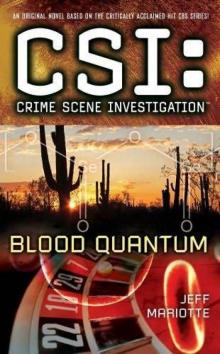 Blood Quantum
Blood Quantum Brass in Pocket
Brass in Pocket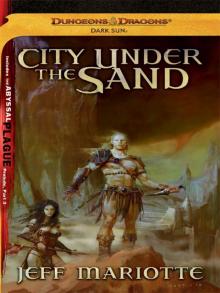 City Under the Sand: A Dark Sun Novel (Dungeons & Dragons: Dark Sun)
City Under the Sand: A Dark Sun Novel (Dungeons & Dragons: Dark Sun)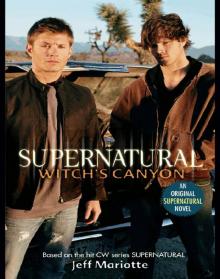 Witch's Canyon
Witch's Canyon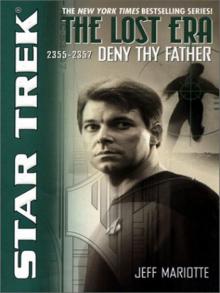 STAR TREK: The Lost Era - 2355-2357 - Deny Thy Father
STAR TREK: The Lost Era - 2355-2357 - Deny Thy Father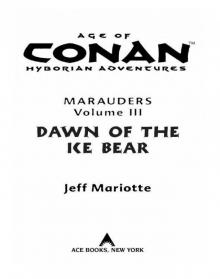 Dawn of the Ice Bear
Dawn of the Ice Bear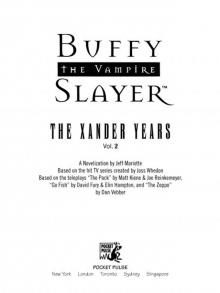 The Xander Years, Vol.2
The Xander Years, Vol.2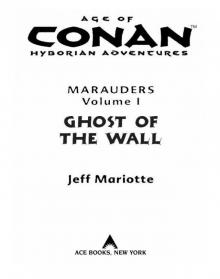 Ghost of the Wall
Ghost of the Wall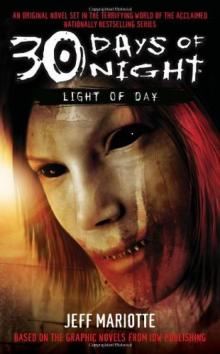 30 Days of Night: Light of Day
30 Days of Night: Light of Day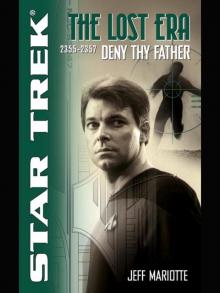 Deny Thy Father
Deny Thy Father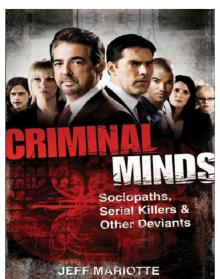 Criminal Minds
Criminal Minds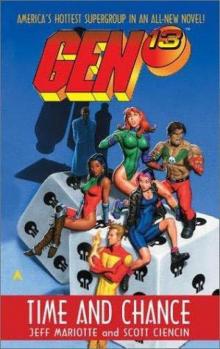 Time and Chance
Time and Chance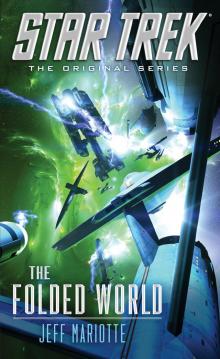 The Folded World
The Folded World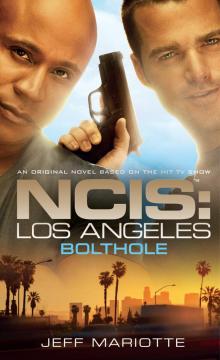 Bolthole
Bolthole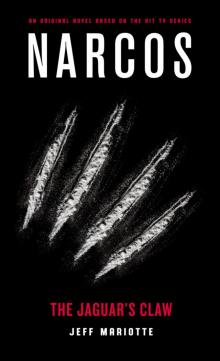 Narcos
Narcos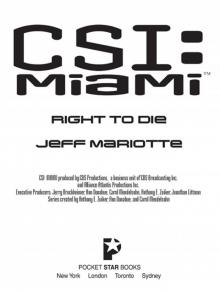 Right to Die
Right to Die